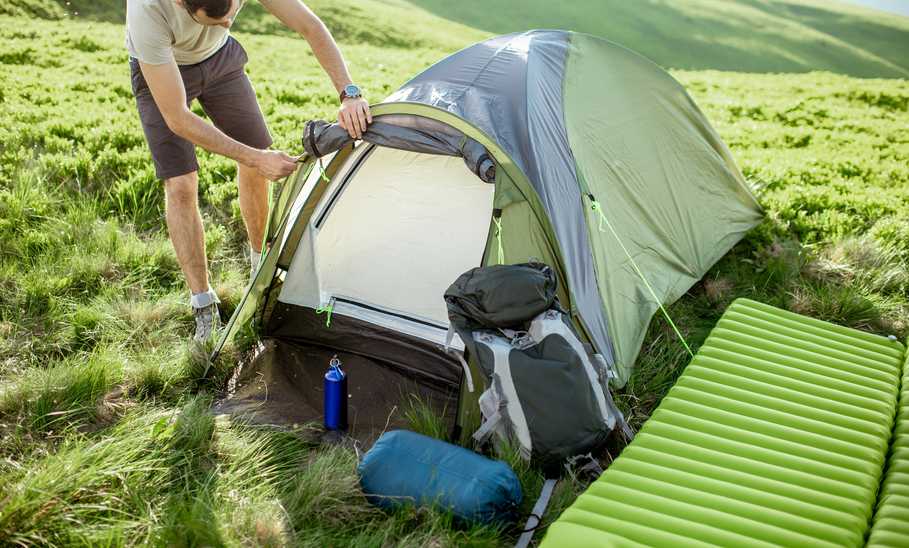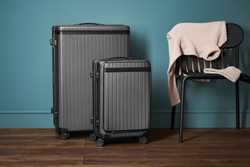updated: October 27, 2024
When the great outdoors calls and camping (or glamping) is on the horizon, make sure your sleep isn’t impacted by snoozing on the hard ground. Investing in a comfortable camping mattress can help you get the restorative rest you need to enjoy your time in nature. Here’s a guide to help you choose the best camping mattress for your budget—and body.
Our top camping mattress picks
![[object Object] [object Object]](https://www.backcountry.com/images/items/1200/TAE/TAEA06P/POSBLU.jpg?t=2099)
Therm-a-Rest MondoKing 3D
40% offSave $96
This highly-ranked camping mattress ticks all the boxes for comfort and ease of use and is good for bad backs. It comes in two sizes and has an R-value of 7—meaning you can camp in seasons beyond summer.
Specifications
- Type: Inflatable
- Good for: Car camping, shorter trips, cabin or large tent camping
- Dimensions: 80 inches x 30 inches x 4.25 inches (comes in two sizes—large and extra-large)
- Thickness: 4.5 inches
- Weight: 5.7 pounds
- R-value: 7
- Comfort: Reviews and users say this is highly rated for comfort.
- East of use: Mixed reviews on how easy they are to deflate and store; otherwise, they are easy to set up
- Price: Varies
Pros:
- Thick mattress for extra comfort
- Easy to set up
Cons:
- It may be too big to use in a small tent
- At 5.7 pounds, it could be cumbersome to take on a long hiking trek
![[object Object] [object Object]](https://www.backcountry.com/images/items/1200/SIC/SICZ2DC/BROSUG.jpg?t=3259)
Single Cloud Camp Bed
This affordable camp bed weighs only six pounds, making it better for car camping than long stays in the wilderness. It is easy to inflate, affordable, and provides excellent insulation against the cold. If you’re on a budget and enjoy weekend car camping, this is a great choice for your wallet and your back.
Specifications
- Type: Self-inflating
- Good for: Short camping trips and car camping
- Dimensions: 78 inches x 30 inches
- Thickness: 3 inches
- Weight: 6 pounds
- R-value: 8.5
- Comfort: Comfortable for a weekend camping
- Ease of use: Easy to inflate and deflate, according to users/customer reviews
- Price on publish: $62.40
![[object Object] [object Object]](https://i5.walmartimages.com/asr/bd5a3894-5e8b-4678-ba58-c5bb16be0e7a.af5cc0bd96bc1c671c1060f4345b5400.jpeg?odnHeight=450&odnWidth=450&odnBg=ffffff)
Lightspeed Outdoors ECO 3D Deluxe Flexform Sleep Pad
30% offSave $27
This self-inflating option makes it easy to set up and provides a barrier of four-inch thickness between you and the ground. One user said it’s their favorite camping sleep pad, but not conveniently small, so if you’re hiking to a campsite, it might not be the best pick. However, this is an affordable and highly recommended choice if you’re taking a trip to your campsite via canoe or car.
Specifications
- Type: Self-inflating sleep pad
- Good for: Drive-in or canoe-in camping trips but not great for backpacking, according to some users
- Dimensions: 78 inches x 30 inches x 4 inches
- Thickness: 4 inches
- Weight: 5.7 pounds
- R-value: 6.3
- Comfort: Rated highly comfortable by users
- Ease of use: Easy to inflate and deflate
- Price on publish: $119
Pros:
- Highly recommended by campers
- Easy to transport via car or canoe
Cons:
- It may be too large for long-distance hiking and camp stays
![[object Object] [object Object]](https://m.media-amazon.com/images/I/31OAS2Z3pjL._SL500_.jpg)
Hest Sleep System
This sleep system is popular if you can afford its hefty price. Easy to inflate and deflate, it comes in two sizes for optional rest. Made from temperature-resilient foam with a seven-inch thickness, users enthusiastically endorse its comfort level. In addition, at 11.8, this is one of the highest R-value portable camping mattresses on the market.
Specifications
- Type: Air mattress
- Good for: Tent, car or ground camping
- Dimensions: 12 inches x 28 inches (packed). Comes in two sizes (rolled out): 25 inches x 78 inches or 30 inches x 78 inches
- Thickness: 7 inches
- Weight: N/A
- R-value: 11.8
- Comfort: Extremely comfortable memory foam
- Ease of use: Reviewers say easy to pump up
Pros:
- Luxury comfort in a travel mattress
- Easy to inflate
- Extremely high R-value
![[object Object] [object Object]](https://www.backcountry.com/images/items/1200/XPD/XPD001I/ONECOL.jpg?t=6603)
Exped Megamat Duo 10 Sleeping Pad
You may want to share your mattress when you camp with your significant other. The self-inflating mattress had mixed reviews for set-up but high recommendations for dual comfortability. It comes in three sizes if you need a camping mattress to spread out.
Specifications
- Type: Self-inflating with a mini pump
- Good for: Weekend camping and camper vans
- Dimensions: 77.6 inches x 52 inches x 3.9 inches
- Thickness: 4 inches
- Weight: 9 pounds
- R-value: 8.1 or 9.5, depending on size
- Comfort: Extremely comfortable
- Ease of use: Some reports of being slow to inflate/deflate
- Price: (varies)
Pros:
- It fits two campers
- Extremely well-insulated
Cons:
- On the heavier side for camping mattresses
- Can’t be used in a small tent
![[object Object] [object Object]](https://m.media-amazon.com/images/I/21CVtuelLgL._SL500_.jpg)
Comfort Plus SI Sleeping Pad
This sleeping pad is lightweight but comfortable, and according to reviews, one of the more easily portable ones on the market. Because it’s self-inflating with a multi-function valve, you don’t have to spend time blowing it up yourself. Extremely compact and weighing approximately 2 lbs, it’s a useful way to get a good night’s rest after a long hike.
Specifications
- Type: Self-inflating
- Good for: Short backpacking trips and camping
- Dimensions: 72 inches x 16 inches - 20 inches x 3.125 inches
- Thickness: 3 inches
- Weight: 2 pounds and 2 ounces (approximate; size large)
- R-value: 4.1
- Comfort: Extremely comfortable, according to reviewers
- Ease of use: Relatively easy to inflate/deflate
- Price: $135.30
Pros:
- Extremely lightweight
- Easy to inflate
Cons:
- Some customers mention it may leak air overnight
![[object Object] [object Object]](https://i5.walmartimages.com/asr/96cde6da-aa81-4f38-9f34-0e179c7ca56e.e938b5c323fd6f6836eb7930d3a245c6.jpeg?odnHeight=612&odnWidth=612&odnBg=FFFFFF)
OutdoorsmanLab Ultralight Sleeping Pad
Light and compact for trips, this one won’t hurt your back. Easy to carry due to its size, it’s also easy to rest on because of its interconnected air cells that support your back while you slumber. There are other sleeping pads and mattresses good for people with back pain, but they’ll cost you much more than this affordable option.
Specifications
- Type: Air valve
- Good for: Campers with back issues, hiking and backpacking; ground and tent camping
- Dimensions: 73" x 21.6" x 2.2" (inflated)
- Thickness: 2.2
- Weight: 14.5 oz
- R-value: 2.2
- Comfort: Comfortable to sleep on and carry while on a backpacking trip
- Ease of use: Easy to inflate and deflate
- Price: $83.99
Pros:
- Inexpensive
- Provides comfort (on a budget) for those with bad backs
- Extremely portable
Cons:
- Not as warm as others on the market
Sea to Summit Ether Light XT Sleeping Mat
Sea to Summit offers a great choice if you want to travel light. Throw it into your pack, grab your bike, or jump in your kayak; at 13.8 oz, it won’t weigh you down. Users say it is comfortable, although its R-value (1.5) shows it’s meant for warm-weather excursions.
Specifications
- Type: Airstream pump
- Good for: Summer backpacking (ultra light), cycling trips, ground and tent camping
- Dimensions: 3.5” x 7.5” (packed)
- Thickness: 4”
- Weight: 13.8 oz
- R-value: 1.5
- Comfort: Excellent comfort factor
- Ease of use: Packs small and extra lightweight
- Price: $179
Pros:
- Ultralight weight
- Packable
- It has a comfortable thickness
Cons:
- Best just for summer or warm-weather camping
How we selected the best camping mattresses
There are many types of mattresses and sleeping pads for camping. The kind you buy should be informed by the trip you’re taking into the wild. We found only a few differences between some of the higher-end models, but a range in size and weight will impact your choice. We combed through hundreds of consumer reviews and talked to campers, backpacking writers, and hikers for their opinions on the most comfortable ways to sleep on the ground.
How to choose the best camping mattress
Backpacking and camping specialists report there are several aspects to a great camp mattress, including packability, durability, amount of insulation provided, and how easy it is to inflate (if you’re using an air mattress). You have to think ahead before you buy one by considering where you’ll be sleeping. If you’re camping high in the Rockies, the climate will be different than a coastal campground.
A camp mattress with heavy insulation is necessary for warmth in the mountains, but you may want a mattress that holds its shape in heat and humidity near the shore. Comfort is key when buying a mattress too, and the weight of the mattress should also be considered.
If you're hiking miles a day with your backpack, you need an extra compact roll-up. If you;re car camping with your kids, a larger air mattress may do the trick. An affordable and comfortable camping pad or mattress is an ideal accessory, just like a packed cooler, for a fun time outdoors.
Mattress types
Most camping mats are either self-inflating (with a pump), closed-cell foam mats that also may be self-inflating, or air mats. There are also air beds that can be used for car camping, but they’re probably too big and unwieldy for a tent.
What is a camping sleeping pad?
A camping sleeping pad is used under your sleeping bag. This pad type usually goes directly on the ground or inside a tent. For car campers, a camping pad or bed could be used in a back seat or hatch of a vehicle.
How does a camping mattress work?
Camping mattresses, depending on the type of material, are designed to provide comfort for outdoor rest. For example, self-inflating pads are comfortable due to their open-cell foam insulation plus air. A pad you must inflate is usually a combination of foam and air. Some pads can be rolled out instead of inflated, and many camping mattresses are small enough when packed in a stuff sack to carry on long backpacking treks.
Frequently asked questions (FAQs)
What is the most comfortable camping mattress?
Camping mattresses made of memory foam are among the most comfortable.
What kind of mattress do you need for camping?
If you're backpacking, you’ll need a lightweight, lightweight mattress that is easy to carry. Car campers can use a larger air mattress or bed. Note: A mattress's R-value defines its capacity to resist heat from going through it, so if you’re winter camping or camping in high elevations where temperatures drop at night, look for a mattress with strong insulation.
How thick should a camping mattress be?
A camping mattress with a 2.5 inch to 3.5 inch thickness should provide ample comfort.
Are foam mattresses good for camping?
Foam, especially memory foam, is an excellent material for camping mattresses. Foam mattresses usually provide support for your back and neck and distribute your weight more evenly across the mattress than one made of air.
The information presented here is created by TIME Stamped and overseen by TIME editorial staff. To learn more, see our About Us page.


![[object Object] [object Object]](https://www.backcountry.com/images/items/1200/TAE/TAEA06P/POSBLU.jpg?t=2099)
![[object Object] [object Object]](https://www.backcountry.com/images/items/1200/SIC/SICZ2DC/BROSUG.jpg?t=3259)
![[object Object] [object Object]](https://i5.walmartimages.com/asr/bd5a3894-5e8b-4678-ba58-c5bb16be0e7a.af5cc0bd96bc1c671c1060f4345b5400.jpeg?odnHeight=450&odnWidth=450&odnBg=ffffff)
![[object Object] [object Object]](https://m.media-amazon.com/images/I/31OAS2Z3pjL._SL500_.jpg)
![[object Object] [object Object]](https://www.backcountry.com/images/items/1200/XPD/XPD001I/ONECOL.jpg?t=6603)
![[object Object] [object Object]](https://m.media-amazon.com/images/I/21CVtuelLgL._SL500_.jpg)
![[object Object] [object Object]](https://i5.walmartimages.com/asr/96cde6da-aa81-4f38-9f34-0e179c7ca56e.e938b5c323fd6f6836eb7930d3a245c6.jpeg?odnHeight=612&odnWidth=612&odnBg=FFFFFF)



